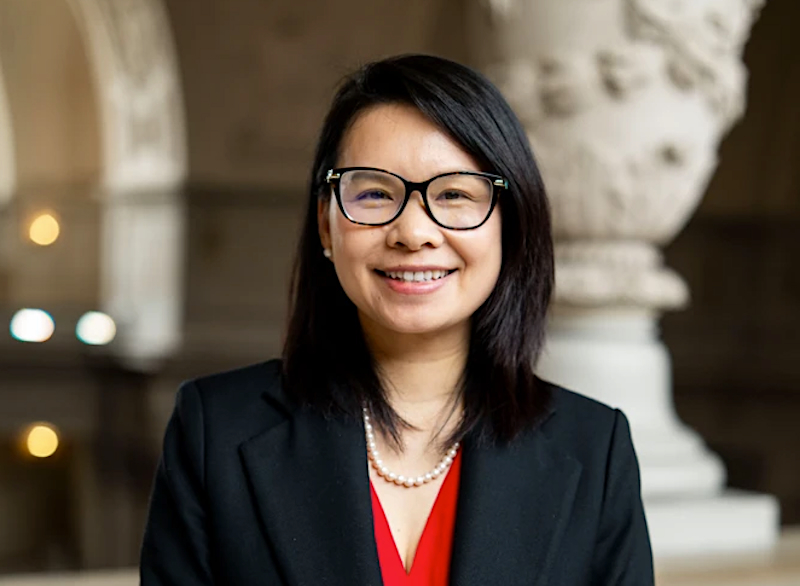The San Francisco supervisors are finally going to have a serious discussion about addressing both economic inequality and the budget deficit by imposing local income and wealth taxes on the very rich.
Sup. Chyanne Chen introduced a resolution Tuesday calling on the city’s state representatives to push for legislation that would allow, not require, counties to enact taxes on wealth and income.

Numerous cities, including New York and Philadelphia, have local income taxes, which are far more progressive and fair than sales taxes or even most business taxes.
The resolution is somewhat similar to one that we proposed back in February. It starts with the concept that income inequality is a crisis, both globally and locally:
WHEREAS, Income inequality is an existential threat to society; and
WHEREAS, Income inequality has direct impacts on the most basic quality of life issues including public health and educational outcomes, food and housing security, and more; and
WHEREAS, Income inequality has existed in cities for generations, including in San Francisco; and
WHEREAS, Income inequality has grown more rampant and pervasive as anti-worker, anti-union, anti-small business corporations and billionaires have spent millions of dollars to advocate for policies that increase income inequality at the expense of working San Franciscans
It also notes that “Congress is negotiating a budget that would give extreme tax breaks to the wealthiest while increasing taxes on the lowest income households.”
In introducing the measure, Chan noted that “low- and middle-income San Franciscans are being disproportionately impacted by the budged decisions, and billionaires aren’t paying their fair share. The wealthiest Americans stand to benefit even more from tax cuts now being discussed in Congress. We need every tool these days.”
Current state law limits what cities and counties can do to raise money—and most of those options are regressive. Sales taxes hit hardest on the poor. Business taxes have to be based on payroll or gross receipts, not profits, which is far from perfect. Property taxes are limited by Prop. 13. Progressives in San Francisco have found creative approaches, including transfer taxes on high-end property sales and higher taxes on the biggest corporations based on gross receipts.
But an income or wealth tax would allow the city to meet two goals: Address, even a small way, the economic inequality that is strangling this country—and cover the budget deficit without massive cuts. And the ones who would pay would be those who most benefit from the Trump tax cuts, which almost everyone in local government and politics oppose.
It could allow the city to lower Muni fares, sales taxes, and taxes on small business—and shift that burden to the more than 50 billionaires and hundreds of centimillionaires who live here.
By my (very conservative) estimate, if we taxed the 5,000 San Franciscans with the highest income (more than $1 million a year) at just the level that would reflect what they save through the Trump cuts, the city could cover its entire deficit with no cuts at all.
Given the collapse of the downtown office economy, and the end, for now, of most federal and some state support, the city’s going to have to figure out how to rethink our finance system.
This is a key part of that discussion; it just requires the state, which loves to put expensive mandates on cities, to also allow them to tax the rich to fund those mandates. State enabling legislation wouldn’t require any local taxes; it would give give counties that option if local voters decided to pursue it.
A local income tax could, for example, exempt the first $500,000 in income, or even the first $1 million, so none of the working-class or middle-class residents would pay a penny. A wealth tax could start at, say, $50 million. So it would be hard the argument that this would “tax San Franciscans for working.” If it’s done right, only a tiny fraction of the residents would be taxed.
Already, the resolution has four co-sponsors: Sups, Connie Chan, Jackie Fielder, Myrna Melgar and Shamann Walton. That means it would need one more vote.
If the labor folks who are demanding no cuts, and shut down the board Tuesday, got on board, it would be hard for the more centrist supes, who still rely on labor support, to oppose it.
That would, I believe, make San Francisco the first city in California to ask the Legislature to make what would be a profound and lasting change to municipal finance in this state. It would also set a national precedent that the solution to austerity budgets is not more cuts, but taxes on the rich—a message that could resonate with millions of voters.
A local vote would force all 11 supes to side with the community or the billionaires—and would force Sen. Scott Wiener and Assemblymembers Matt Haney and Catherine Stefani to side with their constituents or ignore them and let the local billionaires reap the benefits.
I’m sure we will hear that an income tax would encourage the rich to leave, and harm the local tax base—but that hasn’t happened in other cities. There are lots of rich people living in New York. They just deduct their local taxes from their federal taxes—meaning, in effect, that’s money coming from Washington to the city. And frankly, most of these people have so much money that they would barely notice a modest local income or wealth tax.
The resolution will come before the full board Tuesday/24, unless members vote to send it to commiette.
I will be fascinated to see how the discussion—and the vote—goes down.






